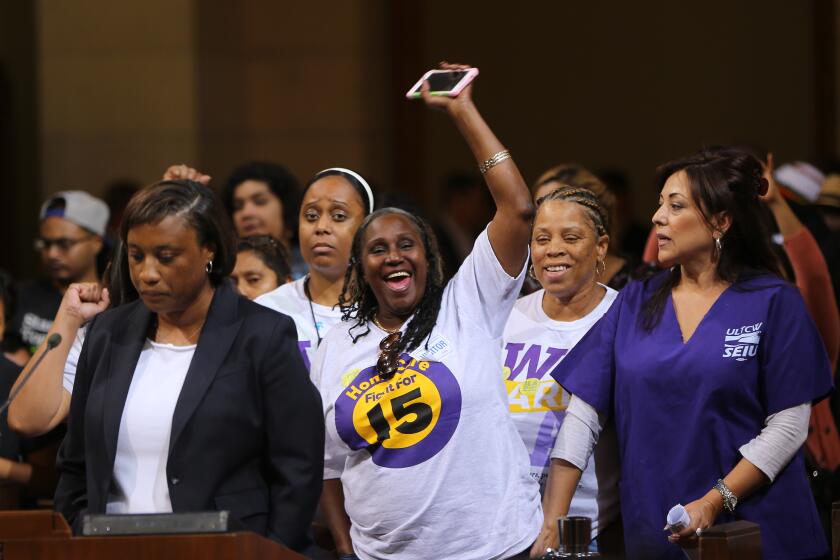Column: Matt Gaetz gave the House a taste of the Senate’s filibuster nightmare

The fall of Rep. Kevin McCarthy as speaker of the House is historic, but can we stop with the “it’s shocking” narrative? It was entirely foreseeable if you remember what a lone voice has been able to accomplish — or impede — over on the other side of Capitol Hill.
Opinion Columnist
LZ Granderson
LZ Granderson writes about culture, politics, sports and navigating life in America.
As he was angling for the job, McCarthy agreed that a single lawmaker could launch the process for his removal, and at that moment we all knew the gavel was not going to be in his hand for long. In a chamber with hundreds of egos and thousands of motives, McCarthy handcuffed his job security to the whims of any one person. In hindsight that concession was less an exchange of power than a surrender. It just happened to take 269 days for his luck to run out, when Rep. Matt Gaetz (R-Fla.) went rogue and ousted McCarthy.
The next House speaker most likely won’t agree to such debilitating terms. In fact, after McCarthy’s removal, a number of Republicans quickly expressed the need to get rid of that rule.
Pledging to name a Black woman to the Senate or as a running mate is so much less than they’ve earned.
Apparently, House Republicans didn’t like being treated like Senate Democrats.
The House is currently rudderless because Gaetz defied his party and used a rule seemingly for his own benefit. I’m reminded of Sen. Joe Manchin III (D-W.Va.), champion of the Senate’s filibuster rule, which he has exploited for his own benefit.
For much of post-Civil War history, the Senate filibuster has been used to slow legislation that would address inequality. Thanks to Manchin, the 118th Congress hasn’t changed that history much.
Biden is siding with labor against capital. Trump is posing as a culture warrior to woo working-class white voters.
Because one senator can threaten to delay a vote indefinitely, any legislation must practically have a filibuster-proof supermajority of at least 60 votes to pass. Even when the Senate has a Democratic majority of 51 votes, progressive policies can’t clear that hurdle. The only way they could reach President Biden’s desk and become law would be if enough senators agreed to change the filibuster rule so that legislation could pass the Senate with a simple majority.
Manchin has vocally defended the rule, leaving his fellow Democrats unable to muster the votes to end filibusters — a maneuver some call the nuclear option.
Why has Congress ground to a halt? Radical Republicans turned a once-proud “small-government” party into a dangerous, nihilistic “anti-government” party.
So even though Democrats won seats in 2020 with the promise of progressive policies such as criminal justice reform and voter protections, they can’t deliver because of one of their own. Manchin’s defense of the filibuster is music to conservative ears only.
Of course, he has to perform for his base back home.
In the last two general elections, Donald Trump won West Virginia by an average of 40 percentage points. Whether Manchin wants to return to the Senate or make a run at the White House as an independent, he figures he can’t be seen as a Biden Democrat. So this one lawmaker can use the threat of a filibuster to override the wishes of the 81 million voters across the country who backed Biden.
Gaetz gets it. After dethroning McCarthy, he is raising money by bragging about being a thorn in his party’s side.
Obstruction is good politics for Gaetz and Manchin, but it’s no way to govern.
When President Obama became the nation’s first Black president, Sen. Mitch McConnell (R-Ky.) said his top priority was to hold him to one term. In the decades before Obama took office, roughly 20 judicial nominees were filibustered. By the time Sen. Harry Reid (D-Nev.) used the nuclear option to change the filibuster rule for judgeships in 2013, nearly 30 of Obama’s nominees had been filibustered.
Manchin voted against changing the rule then despite the blatant abuse, and he’s still against it now. At least he’s consistent.
The man Manchin succeeded, Sen. Robert C. Byrd (D-W.Va.), was once a member of the Ku Klux Klan and spoke for more than 14 hours on the Senate floor trying to stop the Civil Rights Act of 1964 from passing. Over time, Byrd’s views on race changed — thankfully.
But the filibuster continues to be a tool by which a small minority can slow down policies that bend toward racial equality. And Manchin appears content to let that tradition continue, not because of it’s good policy but for his own political ends.
It’s clear many House Republicans regret allowing one person to derail the work of Congress for personal gain. It’s also clear Senate Republicans continue to wield outsize power because Manchin is doing the same.
More to Read
A cure for the common opinion
Get thought-provoking perspectives with our weekly newsletter.
You may occasionally receive promotional content from the Los Angeles Times.















